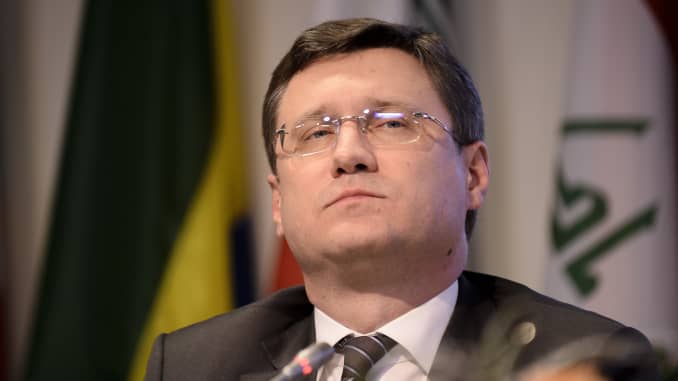
Russia Energy Minister
Alexander Novak pictured at a joint press conference during the 173rd
Ordinary Meeting of the Organisation of Petroleum Exporting Countries
(OPEC) in Vienna, Austria on November 30, 2017.
Omar Marques | Anadolu Agency | Getty Images
- International benchmark Brent crude traded at $37.45 Tuesday morning, up over 8%, while U.S. West Texas Intermediate (WTI) stood at $34.05, around 9% higher.
- It comes after Brent and WTI both dropped 24% on Monday, sinking to more than four-year lows.
- Russia’s energy ministry has proposed to hold a meeting with Russian oil companies on Wednesday, Reuters reported, citing two unnamed sources.
Russia has refused to rule out talks with OPEC to
stabilize energy markets, according to reports, after oil prices
registered their worst declines in almost 30 years on Monday.
International benchmark Brent crude traded at $37.32 Tuesday afternoon, up over 8.5%, while U.S. West Texas Intermediate (WTI) stood at $33.69, around 8.2% higher.
It comes after Brent and WTI both dropped 24% on Monday, sinking to more than four-year lows.
The moves follow a breakdown in talks between the kingpin of oil-producing group OPEC, Saudi Arabia, and non-OPEC member Russia late last week.
Markets had been hoping for an agreement by both countries, and other oil producers, to curb oil output in an effort to bolster prices; their failure to agree led oil prices to crash on Monday.
Speaking to reporters Tuesday, Russian Energy Minister Alexander Novak said that Moscow had not ruled out measures with OPEC to stabilize oil markets, according to Interfax news agency.
Russia’s energy ministry has proposed to hold a meeting with Russian oil companies on Wednesday, Reuters reported, citing two unnamed sources.
They are expected to discuss whether to prolong Russia’s alliance with OPEC.
The collapse of the OPEC and non-OPEC agreement “does not appear to have been part of any pre-meditated strategy or plan on Russia’s part or done with the intention of undermining U.S. shale production,” Daragh McDowell, head of Europe and principal Russia analyst at Verisk Maplecroft, told CNBC via email.
“The arrangement was unpopular with key members of the Russian elite — notably Rosneft’s Igor Sechin — and the economic damage caused by the COVID-19 outbreak provided a handy pretext for abandoning the deal.”
International benchmark Brent crude traded at $37.32 Tuesday afternoon, up over 8.5%, while U.S. West Texas Intermediate (WTI) stood at $33.69, around 8.2% higher.
It comes after Brent and WTI both dropped 24% on Monday, sinking to more than four-year lows.
The moves follow a breakdown in talks between the kingpin of oil-producing group OPEC, Saudi Arabia, and non-OPEC member Russia late last week.
Markets had been hoping for an agreement by both countries, and other oil producers, to curb oil output in an effort to bolster prices; their failure to agree led oil prices to crash on Monday.
Speaking to reporters Tuesday, Russian Energy Minister Alexander Novak said that Moscow had not ruled out measures with OPEC to stabilize oil markets, according to Interfax news agency.
Russia’s energy ministry has proposed to hold a meeting with Russian oil companies on Wednesday, Reuters reported, citing two unnamed sources.
They are expected to discuss whether to prolong Russia’s alliance with OPEC.
The collapse of the OPEC and non-OPEC agreement “does not appear to have been part of any pre-meditated strategy or plan on Russia’s part or done with the intention of undermining U.S. shale production,” Daragh McDowell, head of Europe and principal Russia analyst at Verisk Maplecroft, told CNBC via email.
“The arrangement was unpopular with key members of the Russian elite — notably Rosneft’s Igor Sechin — and the economic damage caused by the COVID-19 outbreak provided a handy pretext for abandoning the deal.”
How did we get here?
Last
week, the 14-member group recommended additional production cuts of 1.5
million bpd starting in April and extending until the end of the year.
But OPEC-ally Russia rejected the additional cuts when the broader
energy alliance met on Friday.
The meeting concluded with no directive about the production cuts that are currently set to expire at the end of the month.
In
response, Saudi Arabia announced massive discounts to its official
selling prices for April, with state-owned oil giant Saudi Aramco
expected to ramp up production.
No comments:
Post a Comment